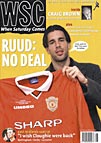 Gary Oliver examines the latest row over the entry requirements for the Scottish Premier League
Gary Oliver examines the latest row over the entry requirements for the Scottish Premier League
It is almost 40 years since Falkirk’s record loss, an 11-1 trouncing by Airdrie. But that margin of defeat was equalled on March 31 when they were defeated 10-0 by the Scottish Premier League, the clubs in the top division voting unanimously to bar Falkirk from next season’s SPL.
The SPL is expanding to 12 teams, and to be eligible a First Division club had to have 10,000 covered seats installed by the end of March. Only Dunfermline and Airdrie began the season meeting the criterion, while St Mirren, Raith and Livingston each promised to comply. The others shrugged their shoulders.
The insouciant clubs included Falkirk, runners-up in both 1998 and 1999 when only the champions were promoted. This season, the teams finishing second and third are entitled to face the bottom SPL club in round-robin play-offs (the top two joining the First Division champions in the Premier League). But while the Bairns’ team is certainly good enough, their stadium remains a relic.
Unable or unwilling to develop cramped Brockville Park, Falkirk have for years spoken airily of funding a move by selling the town centre site, and the present board hopes to have conjured up a new stadium by this time next year. Needing to lodge temporarily elsewhere, Falkirk cheekily agreed to hire Murrayfield for SPL fixtures next season. One had to admire their chutzpah; predictably, though, the Premier clubs ruled out groundsharing and refused to cut Falkirk any slack.
“We have a duty to operate in a fair and consistent way in the application of stadia rules,” declared SPL spokesman Lex Gold. “To do otherwise would be unfair to the clubs who have tried and succeeded in meeting our requirements.” But is it “fair” that First Division fans have watched a league in which the rewards would not necessarily go to those winning the most points? According to Gold, “Our criteria were based on the safety regulations enshrined in the Taylor Report.” But when that legislation took effect in 1994, didn’t Celtic decamp to Hampden for a year? And Lex Gold’s Hibernian, along with city rivals Hearts, both got away with installing benches on open terracing and handing out cagoules (actually bin liners) to sodden spectators – not what Taylor had envisaged.
Though granted no similar concessions, the Falkirk directors spoke phlegmatically, which was more than could be said for some First Division rivals. Raith Rovers, with least work to do, celebrated early compliance by threatening legal action should the SPL extend the March 31 deadline by even one day. And when champions-elect St Mirren completed their new stand with a few days to spare, chairman Stewart Gilmour joined the sanctimonious chorus. Falkirk had earlier discussed using the all-seated Shyberry Excelsior – home of Airdrie, currently in provisional liquidation – and the SPL created a stink by conceding that Falkirk would be accepted if they were to acquire ownership. “There should be no extension to the March 31 deadline,” wailed Gilmour. “Falkirk should have bought the Shyberry six months ago.”
Raith Rovers director Colin McGowan had even less sympathy for the Bairns’ straits, describing Falkirk as “opportunist vultures” for attempting “a hostile takeover of a stadium that would wipe a football club off the face of the Earth”. Not that Falkirk could realistically have bought a ground that remains council owned. And though Raith expressed outrage on Airdrie’s behalf, Falkirk’s chairman insisted, “We were approached by Airdrie first to supply them with an income stream.”
Nevertheless, McGowan ranted, “I have taken legal counsel and would spend my last penny on stopping this shower.” Knockabout stuff, but it was also evidence of aspirant clubs fighting amongst themselves rather than for common causes such as a larger top division or more equitable distribution of monies.
Meanwhile, the SPL’s strugglers could hardly believe their luck: Falkirk staying in the top three would mean no play-off and no threat of relegation. Falkirk’s dilemma, therefore, was to either remain committed, thereby protecting an SPL club that had rejected them, or else throw in the towel, allowing Raith the chance of promotion. The same Raith whose director Colin McGowan had warned, “If anyone from Falkirk were to park their car at the Shyberry, it will end up scrap metal.” Unfortunately, the integrity of Scottish football had already been vandalised beyond recognition.
From WSC 160 June 2000. What was happening this month
There can be no sympathy whatsoever for Falkirk. The rules may have been stupid (not a point Falkirk seem to have made – instead they tried every backhand way of complying with them), but the rules were the rules. A number of clubs complied with those rules and got into financial difficulty in so doing (St Mirren, Raith, Patrick Thistle, Airdrie), while Falkirk had the likes of Mo Johnston and Chris Waddle turning out for them in the 90s. Little wonder Stewart Gilmour "wailed" when he had not only built two new stands, but also put together the best team in the division by a distance.